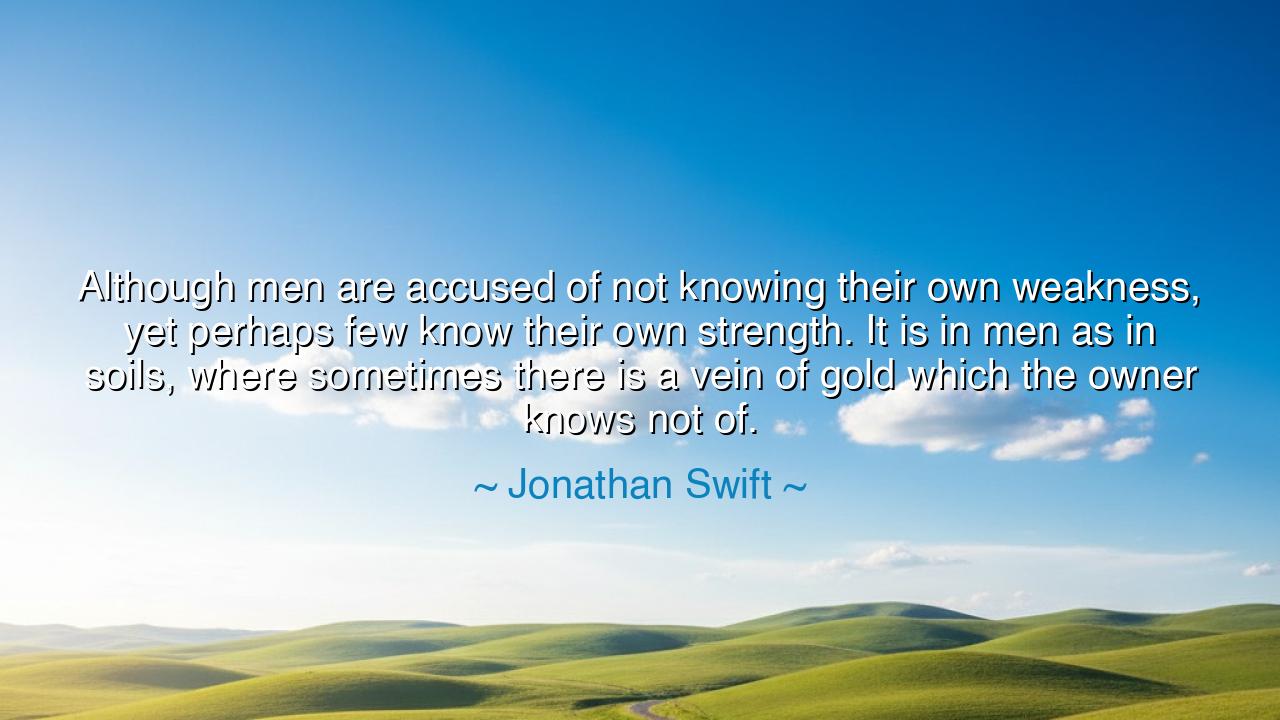
Although men are accused of not knowing their own weakness, yet
Although men are accused of not knowing their own weakness, yet perhaps few know their own strength. It is in men as in soils, where sometimes there is a vein of gold which the owner knows not of.






Jonathan Swift, the sharp-tongued satirist and sage, once wrote with piercing insight: “Although men are accused of not knowing their own weakness, yet perhaps few know their own strength. It is in men as in soils, where sometimes there is a vein of gold which the owner knows not of.” In these words, he reveals one of the great mysteries of the human soul: that we are often blind not only to our frailties, but to the hidden strengths that lie buried within us, waiting for trial, for toil, or for time to uncover them.
The meaning of this saying is rich and profound. Swift compares man to the soil, which may appear barren on the surface, rough or unremarkable, yet within may lie treasures of immeasurable value. In the same way, a person may walk through life doubting themselves, seeing only their faults and limitations, never realizing that within them lies a “vein of gold”—a hidden talent, a resilience, a courage, or a brilliance that neither they nor others have yet discovered. Just as the miner must dig deep to uncover gold, so must life’s challenges often dig into us before our true strengths are revealed.
The origin of this thought arises from Swift’s own keen observation of human nature. Living in a time of political upheaval, religious division, and human folly, he was often dismayed by how men underestimated themselves. People saw their errors, mocked their limitations, and accused one another of ignorance and weakness, yet how rarely did they recognize the potential within! Swift, with his unflinching wit, called his generation to a deeper truth: that man is more than his frailties, and that within each soul may lie hidden powers yet unseen.
History provides many examples of this truth. Consider Abraham Lincoln, who in his youth was mocked as awkward, unlearned, and unlikely to succeed. For years, he himself doubted his worth. Yet when the fires of civil war engulfed his nation, the hidden vein of gold was struck, and from him poured forth wisdom, endurance, and moral strength that saved a country from destruction. Or think of Joan of Arc, a simple peasant girl, dismissed as weak and powerless. Within her, however, lay a courage that rallied armies and altered the course of nations. Neither Lincoln nor Joan knew their full strength until the call of destiny revealed it.
The imagery Swift uses is deeply evocative: a man is like earth, outwardly ordinary, perhaps neglected, but inwardly filled with veins of treasure. Some never discover the wealth within themselves, because they never dig, never endure, never dare. Others are fortunate enough to have circumstances—or trials—that strike the hidden vein, forcing them to bring forth their true power. Thus, Swift teaches that weakness is often obvious, but strength may be hidden, and to underestimate oneself is as grave an error as to overestimate.
The lesson for us is clear: do not stop at the surface of your life. Dig deeper. Do not judge yourself only by your current struggles or visible achievements. Instead, recognize that within you lies more than you know—capacities untapped, gifts undiscovered, resilience untested. Just as the soil reveals its treasure only to those who labor to uncover it, so too your strength will reveal itself only when you strive, when you endure, and when you dare to go beyond the limits you imagine for yourself.
Practically, this means embracing challenges rather than fleeing them, for challenges are the tools that strike the gold within. It means listening when others see gifts in you that you cannot yet see yourself. It means refusing to be defined only by your failures, and seeking instead to discover what lies beneath them. For within every man and woman lies a strength that may one day shine forth, if only they dare to dig deep enough.
So let Swift’s words be carried like a lamp for the journey: “Few know their own strength. It is in men as in soils, where sometimes there is a vein of gold which the owner knows not of.” Remember that you are more than your surface, more than your doubts, more than your present weakness. Dig into the depths of your being, and you may uncover treasures that not only enrich your own life, but illuminate the lives of all who walk beside you.






AAdministratorAdministrator
Welcome, honored guests. Please leave a comment, we will respond soon